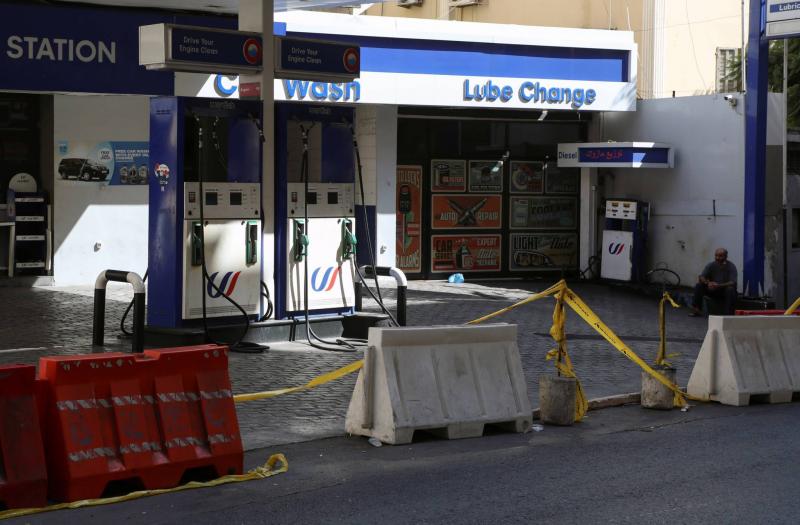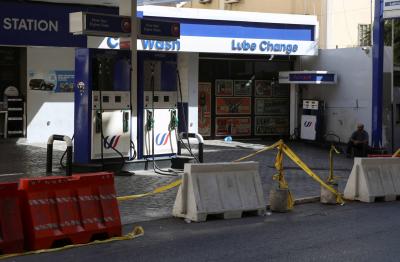Daily wholesale price tables are released, linked to the dollar exchange rate, sourced from the Ministry of Energy in an attempt to contain the fuel crisis and avoid repeating the scenes known as "queues of humiliation" from the summer of 2021. However, while this attempt has succeeded temporarily, it is likely to collapse when the dollar exchange rate begins to rise dramatically again.
The first indicator of the return of this crisis appeared from the "Lebanese Gas Station Owners Association," which announced a protest action tomorrow morning in front of the Ministry of Energy, demanding the dollarization of fuel prices and pricing gasoline by the dollar at fuel pumps, similar to what supermarkets and other commercial sectors do, or finding other solutions including activating the platform.
**Dollars Unify the Gas Station Owners**
Fadi Abu Chacra, the representative of the fuel distributors, opposes the association's statement and action, confirming in a conversation with "Wardna" that everyone knows "there is no association or gathering," and that everyone operates under the law, adhering to the prices issued by the Ministry of Energy, and that "the matter of dollarization pertains to the ministry and not to us." He accused the statement's authors of seeking to act "to secure a seat for themselves." However, Abu Chacra also confirmed his support for the idea of dollarization in the sector, given that the situation has become "tragic" with their inability to cope with the fluctuations of the dollar, placing the solution and linkage at the Ministry of Energy, which, as a supervisory ministry, must make the appropriate decision.
In parallel with the gas stations union, Maroun Shamas, the president of the "Importing Oil Companies Association," stated in a conversation with "Wardna," that companies receive payments in dollars and provide stations in dollars, and thus "are not affected by dollar manipulation." However, the stations are "the victims due to selling in Lebanese pounds, and despite the fact that this commodity is paid for in dollars, it should be purchased in dollars." He viewed the suffering of the stations as inevitably impacting the entire fuel sector, including the importing companies. Therefore, he believes the solution lies in each station having one pump priced in dollars and another in Lebanese pounds, allowing Lebanese citizens to choose what suits them.
**The Energy Ministry: No Capacity for Dollarization**
What suits the stations and distribution companies may not suit the Ministry of Energy, especially since Minister Walid Fayad had previously indicated that he would not proceed with pricing gasoline in dollars, stating that doing otherwise would be against the law. He reiterated in an exclusive conversation with "Wardna" that "dollarization is not determined by a single ministry, but is the responsibility of the state and the monetary authority," noting that the Currency and Credit Law and the Consumer Protection Law stipulate that "when a citizen in Lebanon purchases a commodity, he must pay for it in Lebanese pounds." He questions: how can he change the citizen's entitlement? Or Lebanon's identity?
Fayad clarifies to "Wardna" that when there was manipulation of the dollar exchange rate, the ministry began issuing prices every two weeks, then every week, eventually reaching three prices per day, "to preserve the laws, to protect the gas station owner’s rights, and to ensure that the citizen buys in the Lebanese pound, which is his right in his country." He further adds that recently "we have been lenient with gas station owners and citizens, stating that those wishing to pay in dollars have complete freedom while preserving citizens' rights."
He notes that the dollar price has remained stable during the month of Ramadan, hinting that this decision "is a political decision," stating that in all cases "he does not see any loss for the station owners."
**Interconnected Crises**
The fuel crisis, compounded by the absence of transportation plans, means the crisis is completing its cycle, ultimately landing in the pockets of citizens. For instance, the cost to reach Jbeil in 2019 was three thousand Lebanese pounds, but now it has reached three hundred thousand pounds.
This significant difference has not alleviated the consumption rate in line with the scale of the crisis, due to the absence of public transportation options. In this context, researcher Muhammad Shamseddine from the International Information Center explains that "citizen consumption declined by 25 percent in February," predicting an increase during the first half of this year.
The experience of the COVID-19 pandemic, where employees worked from home, contributed to the cancellation of this experience amid the intensifying fuel crisis, which partially explains the decline in consumption. However, what will this decrease look like if the entire sector is dollarized?
There is no clear answer yet, and the anxiety about what the days and weeks to come might bring does not only concern citizens—economists, the International Monetary Fund, and the international community share their concerns, along with all the globally circulated figures regarding the reality of the economic crisis, which is managed "populistically" instead of through laws, as stated by MP Michel Daher before the "Lebanese-Dutch Businessmen Association."




